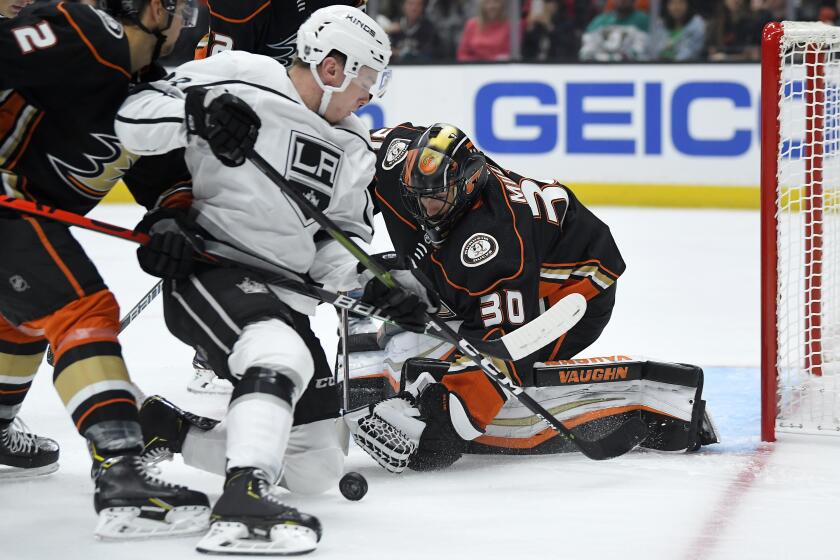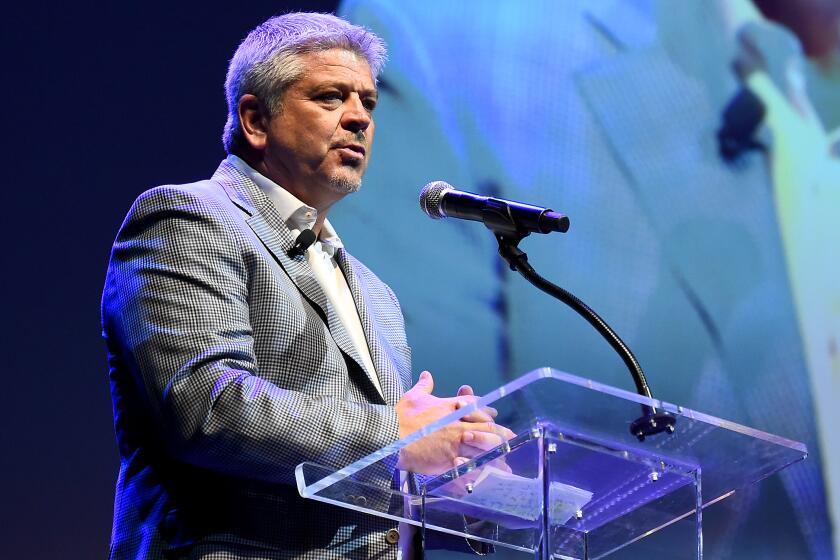Kings’ core four tasked with reviving franchise’s Stanley Cup aspirations
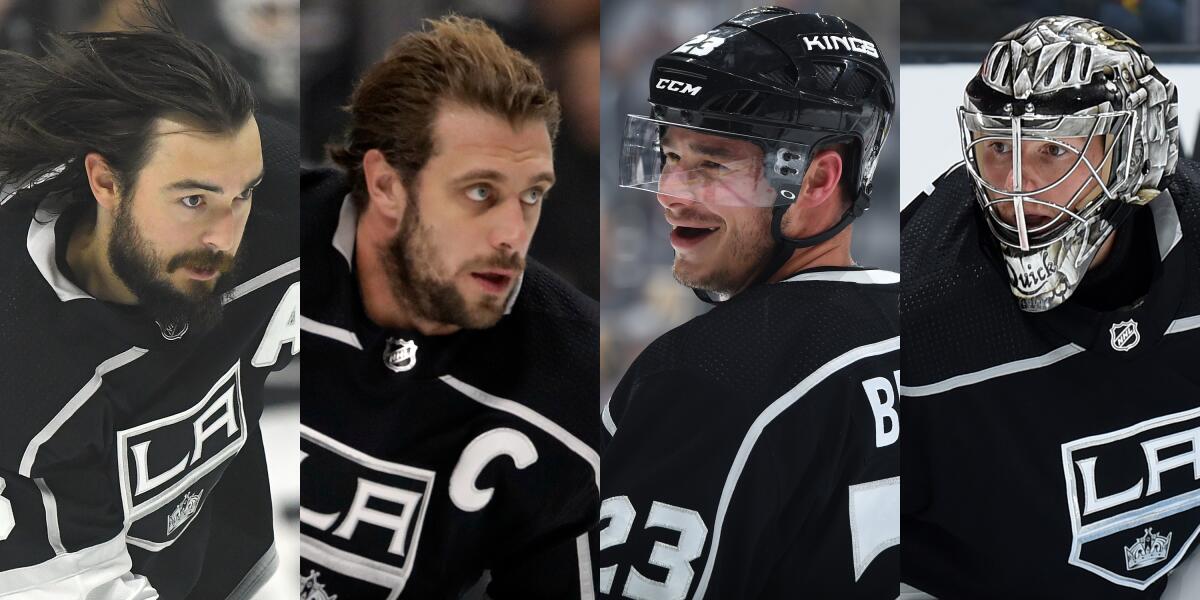
- Share via
In typical unfiltered and resolute form, Drew Doughty barely let the question finish before interjecting.
The Kings defenseman is known for having opinions on, well, everything. His game. His teammates. His coaches. Even the NHL’s evolving style of play. Few topics are off-limits for the straight-shooting, front-teeth-missing, five-time All-Star.
His role as a leader, with the franchise in flux, is no different. Along with Anze Kopitar, Dustin Brown and Jonathan Quick, Doughty is one of the Kings’ four mainstays this decade.
That group has been at the forefront of each of the last nine seasons, a run that began with a long-awaited playoff berth in 2010, peaked with Stanley Cup championships in 2012 and 2014, and bottomed out in a second-to-last-place finish last season.
Sitting in front of his locker recently, Doughty was reminded of all this. Then he was asked: “Do you guys feel a responsibility to help rebuild?”
He jumped in with a passionate, pointed answer.
“Yeah, for sure,” he said, his voice rising an octave, as if there was any other choice. “We’re the leaders on the team.”
Los Angeles Kings coach Todd McLellan and Anaheim Ducks coach Dallas Eakins addressed final roster cuts and where their younger players fit into the picture.
In a league of mercenaries, long-tenured quartets are rare.
In their decade together, Doughty, Brown, Kopitar and Quick helped lift the franchise to the pinnacle of the sport, then couldn’t keep it from slipping to punching-bag status.
They’ve been through four coaching changes, and seen the club’s prospect pool turn over time and again. They’ve been at the forefront of one NHL revolution, the paragon of puck possession and defensive fortitude; then lagged far behind another, as speed and movement have again modernized the game.
Now, at the point when most teams cut bait and sever ties with the aging players tethered to a fallen dynasty, the Kings are hoping to rebuild around their rooted veterans. This is somewhat out of necessity, given the hefty contracts to which each is signed (all of them are inked through at least 2021-22 and have average annual values of at least $5.8 million). But it’s partly by choice too.
A changing of the guard is on the horizon. And the Kings are counting on their core four to help guide them into the future.
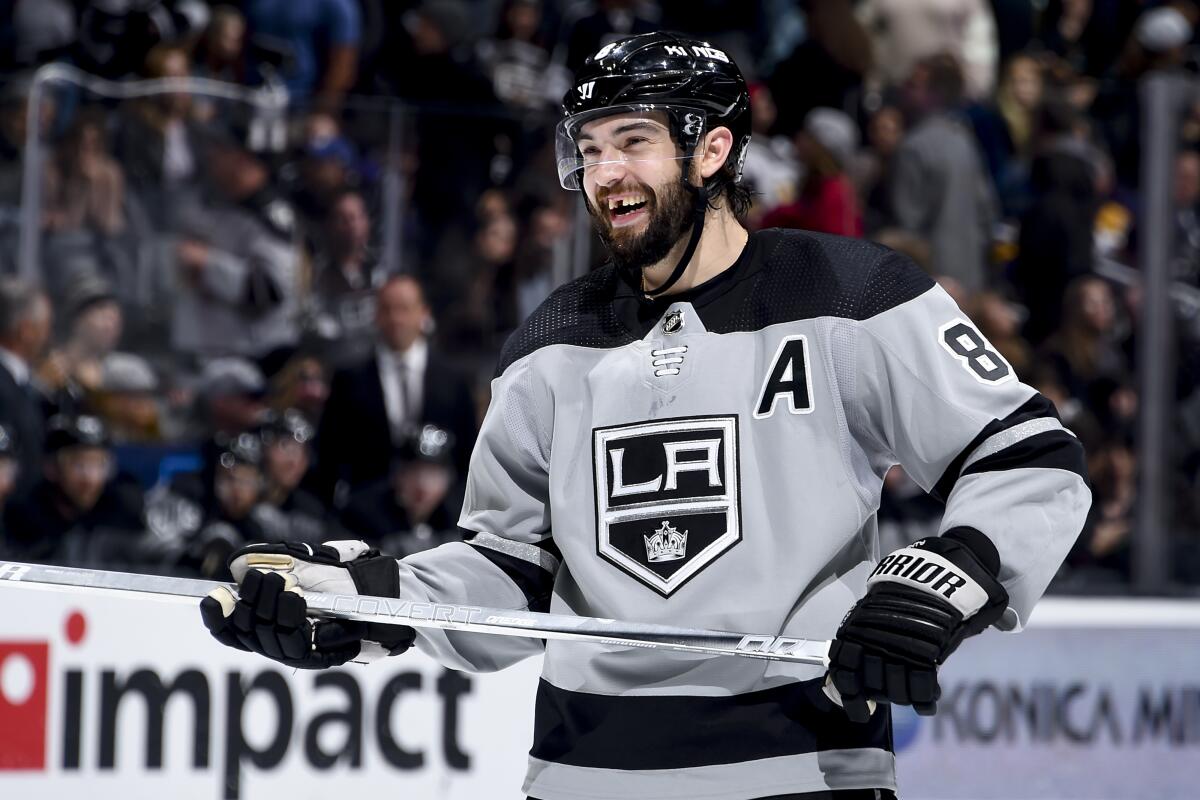
“Who doesn’t want to be in that role?” Doughty said. “The guy that’s looked upon to lead the team — that’s what I’ve wanted to be my whole life. Now that I finally have it, I just want to get better at it.”
::
During the 2009-10 season, Doughty was a frequent visitor to then-general manager Dean Lombardi’s office. As the defenseman remembers it, their conversations often followed a familiar script.
“Can you handle this? Can you do this?” Lombardi would ask Doughty, then in his second year, the last member of the Kings’ core four to break into the league.
Doughty would answer confidently: “Yes.”
Lombardi would counter: “No you can’t.”
Doughty would snap back: “Yes, I can.”
There was a method to Lombardi’s madness.
“He did it,” Doughty said, “because he wanted me to become what am I now.”
Entering that campaign, the Kings were mired in a six-season playoff drought. The team had veteran leadership in Sean O’Donnell, Rob Scuderi, Justin Williams, Matt Greene and Jarret Stoll, but had finished last in the Pacific Division the previous two years.
Tom Laidlaw doesn’t want to be known simply as a former Kings defenseman. As a contestant on “Survivor,” he found a way to test his vigor at age 61.
By the time 2009-10 rolled around, the Kings’ path forward was clear. Before they could win rings and raise banners, they needed Brown and Kopitar and Doughty and Quick— all of whom were 25 or younger — to carry the torch.
So, Doughty was pushed by Lombardi and recorded 59 points. Brown continued to evolve in his second season as team captain. Kopitar not only played the most minutes of any forward, but finished with the first positive plus-minus rating of his career. Quick started a career-high 71 games in net. Over the course of the season, the Kings began transforming into a contender.
They collected 101 points and made the playoffs for the first time since 2002. As the No. 6 seed, they took the third-seeded Vancouver Canucks to six games in the first round.
The team would add more veterans, including Jeff Carter and Mike Richards, en route to their Stanley Cup titles. Only nine players remain on the team from their 2014 championship.
But the four-person nucleus that keyed that first playoff run remains. Now, they’re on the other end of the spectrum, tasked with being the steady hands for a significant rebuild.
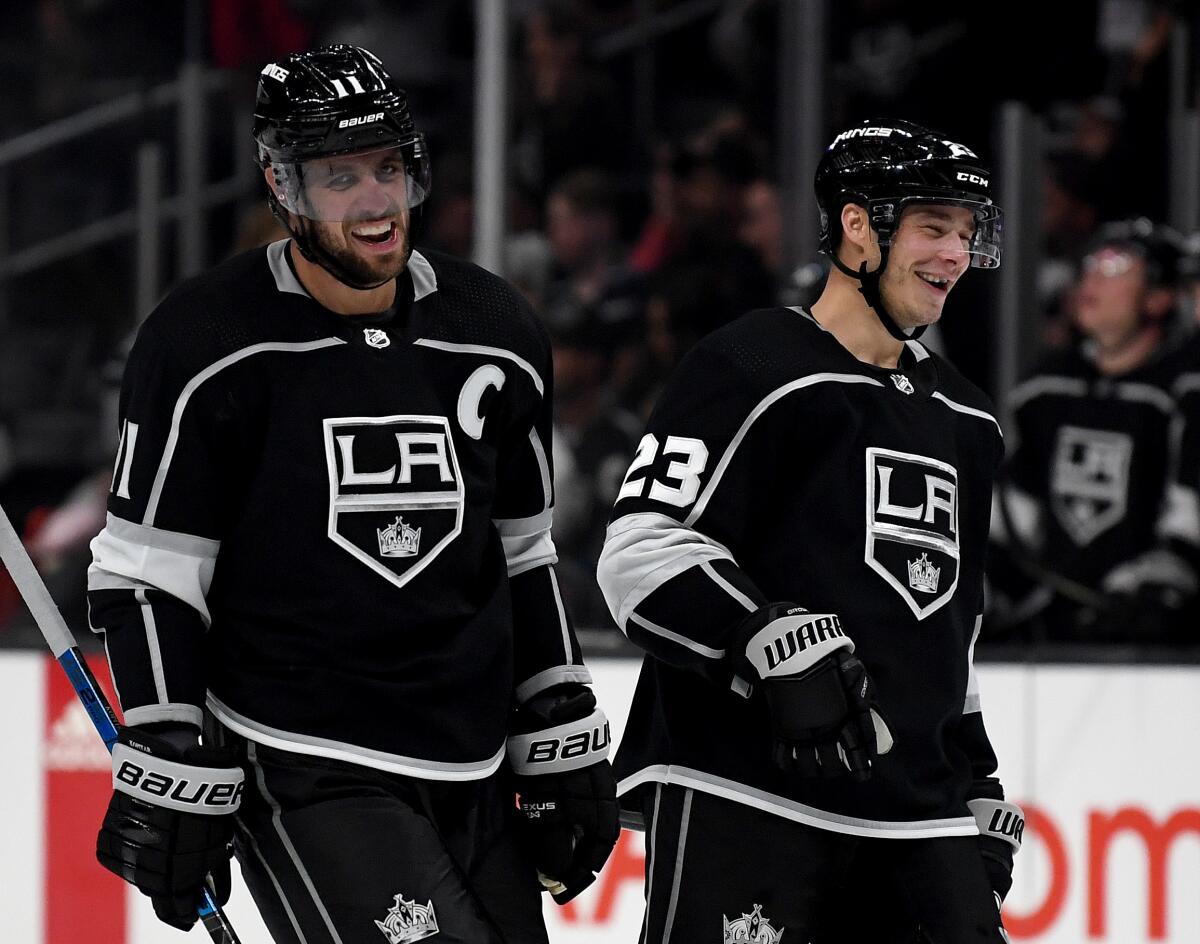
Said Kopitar: “We’ve been here for a little while now. We’re used to winning. … We’re going to have to lead the way. And pull the young guys with us.”
Brown: “Part of it is setting the example of how things are supposed to be done, and the other part is holding each other accountable. It’s pretty easy if Kopi and Dewey, myself, if guys like that are being held accountable, then it makes it a lot easier to hold the line elsewhere.”
Quick: “There’s more than just four of us. There’s a lot of us here. We’ve been through what it takes to have success in this league.”
::
Since being hired as the Kings’ coach in April, Todd McLellan has been reticent to reference what happened to the team last year. He watched from afar as the Kings plummeted to a 71-point campaign, the worst in the Doughty-Kopitar-Brown-Quick era. McLellan has been careful to not pass judgment, or juxtapose himself to either of the two coaches the Kings put behind the bench last year.
He did take notice, however, of the players’ comments over the course of 2018-19, which went from candid to discouraged to flat-out dejected as the season spiraled out of control. The core four veterans were among the most outspoken critics:
- Following a 5-1 loss to the Toronto Maple Leafs on Nov. 13, just a week after coach John Stevens was fired and replaced by interim coach Willie Desjardins, Kopitar said: “It was a lack of desperation, work, energy, emotion, whatever. That kind of effort, it’s unacceptable.”
- In the wake of a 6-3 defeat to the New Jersey Devils on Dec. 6, Doughty said: “It’s pathetic. It’s embarrassing. It’s frustrating.”
- With the Kings shaping up to be sellers at the trade deadline in late February, Brown said: “Right now, we’re a losing team. It’s difficult and a new experience for a lot of guys.”
- On Feb. 26, Quick berated Dejardins on the bench for not challenging a goalie interference call.
Those frustrated outbursts left an impression on McLellan. He’s long been familiar with these players, having coached against them in the Pacific Division every year since 2008-09 with the San Jose Sharks and Edmonton Oilers. He pointed to those moments from last year as proof the Kings’ long-standing leadership group still has plenty left to prove.
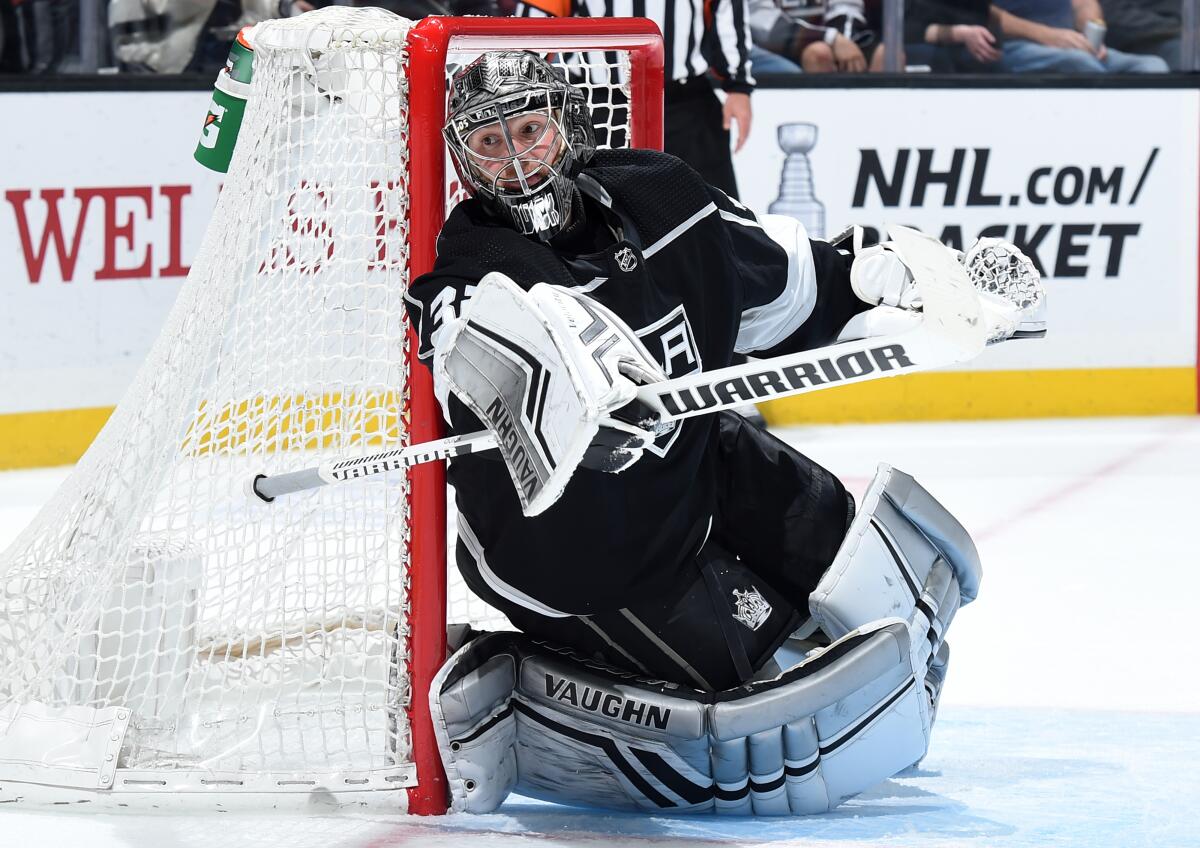
“They spoke up,” McLellan said. “When you put it on the line like that at the end of last year, you have to provide the team with those things.
“Last year was a down year by team standards, individual standards. The pride got away from them. Right now, I sense that they’re a proud group. They’re willing to try anything.”
First practices led by Los Angeles Kings coach Todd McLellan have followed the rhythm of a jazz band — high-paced with a tendency to stop on a dime.
After last year, they may need to. The culture they spent years building crumbled. For the Kings’ core four, the glory days are likely behind them. They’re bracing for their new gritty reality.
“It’s really up to us leaders to drive the bus,” Doughty said. “We’ve tried to drive the bus for the last few years and it hasn’t really worked.”
Then Doughty paused, contemplating the challenge ahead.
“Maybe,” he continued, “I don’t know — maybe we have to do some things differently. You can always do things differently. We need an entire team effort. We need our leaders to lead.”
More to Read
Go beyond the scoreboard
Get the latest on L.A.'s teams in the daily Sports Report newsletter.
You may occasionally receive promotional content from the Los Angeles Times.

